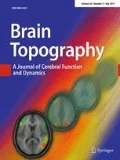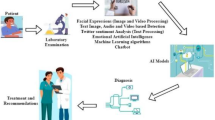Abstract
Being able to predict who will likely experience cancer related cognitive impairment (CRCI) could enhance patient care and potentially reduce economic and human costs associated with this adverse event. We aimed to determine if post-treatment patient reported CRCI could also be predicted from baseline resting state fMRI in patients with breast cancer. 76 newly diagnosed patients (n = 42 planned for chemotherapy; n = 34 not planned for chemotherapy) and 50 healthy female controls were assessed at 3 times points [T1 (prior to treatment); T2 (1 month post chemotherapy); T3 (1 year after T2)], and at yoked intervals for controls. Data collection included self-reported executive dysfunction, memory function, and psychological distress and resting state fMRI data converted to connectome matrices for each participant. Statistical analyses included linear mixed modeling, independent t tests, and connectome-based predictive modeling (CPM). Executive dysfunction increased over time in the chemotherapy group and was stable in the other two groups (p < 0.001). Memory function decreased over time in both patient groups compared to controls (p < 0.001). CPM models successfully predicted executive dysfunction and memory function scores (r > 0.31, p < 0.002). Support vector regression with a radial basis function (SVR RBF) showed the highest performance for executive dysfunction and memory function (r = 0.68; r = 0.44, p’s < 0.001). Baseline neuroimaging may be useful for predicting patient reported cognitive outcomes which could assist in identifying patients in need of surveillance and/or early intervention for treatment-related cognitive effects.



Similar content being viewed by others
References
Aghakhani A, Chan EK (2007) Test reviews: Bracken BA and Howell K (2004). Clinical assessment of depression. Odessa, FL: psychological assessment resources. J Psychoeduc Assess 25:416–422. https://doi.org/10.1177/0734282907300383
Amidi A, Christensen S, Mehlsen M, Jensen AB, Pedersen AD, Zachariae R (2015) Long-term subjective cognitive functioning following adjuvant systemic treatment: 7–9 years follow-up of a nationwide cohort of women treated for primary breast cancer. Br J Cancer 113:794–801. https://doi.org/10.1038/bjc.2015.243
Ashburner J (2012) SPM: a history. NeuroImage 62:791–800. https://doi.org/10.1016/j.neuroimage.2011.10.025
Basch E et al (2016) Symptom monitoring with patient-reported outcomes during routine cancer treatment: a randomized controlled trial. J Clin Oncol 34:557–565. https://doi.org/10.1200/JCO.2015.63.0830
Bates D, Mächler M, Bolker B, Walker S (2015) Fitting linear mixed-effects models using lme4. 67:48. https://doi.org/10.18637/jss.v067.i01
Becker H, Henneghan A, Mikan SQ (2015) When do I get my brain back? Breast cancer survivors’ experiences of cognitive problems. Clin J Oncol Nurs 19:180–184. https://doi.org/10.1188/15.CJON.180-184
Benton A, Hamsher Kd, Sivan AB (2000) Multilingual aphasia examination, 3rd edn. Psychological Assessment Resources Inc, Lutz
Boykoff N, Moieni M, Subramanian SK (2009) Confronting chemobrain: an in-depth look at survivors’ reports of impact on work, social networks, and health care response. J Cancer Surviv 3:223–232. https://doi.org/10.1007/s11764-009-0098-x
Bray VJ, Dhillon HM, Vardy JL (2018) Systematic review of self-reported cognitive function in cancer patients following chemotherapy treatment. J Cancer Surviv. https://doi.org/10.1007/s11764-018-0692-x
Breiman L (2001) Random forests. Mach Learn 45:5–32. https://doi.org/10.1023/A:1010933404324
Cortes C, Vapnik V (1995) Support-vector networks. Mach Learn 20:273–297
Crawford JR, Smith G, Maylor EA, Della Sala S, Logie RH (2003) The Prospective and Retrospective Memory Questionnaire (PRMQ): normative data and latent structure in a large non-clinical sample. Memory 11:261–275. https://doi.org/10.1080/09658210244000027
de Sousa Magalhães S, Malloy-Diniz LF, Hamdan AC (2012) Validity convergent and reliability test-retest of the Rey Auditory Verbal Learning Test Age (years). Clin Neuropsychiatry 20(19):11
Deprez S, Kesler SR, Saykin AJ, Silverman DHS, de Ruiter MB, McDonald BC (2018) International cognition and cancer task force recommendations for neuroimaging methods in the study of cognitive impairment in non-CNS cancer patients. J Natl Cancer Inst 110:223–231. https://doi.org/10.1093/jnci/djx285
Gabrieli JDE, Ghosh SS, Whitfield-Gabrieli S (2015) Prediction as a humanitarian and pragmatic contribution from human cognitive neuroscience. Neuron 85:11–26. https://doi.org/10.1016/j.neuron.2014.10.047
Gibbons C, Bower P, Lovell K, Valderas J, Skevington S (2016) Electronic quality of life assessment using computer-adaptive testing. J Med Internet Res 18:e240. https://doi.org/10.2196/jmir.6053
Gotay CC, Kawamoto CT, Bottomley A, Efficace F (2008) The prognostic significance of patient-reported outcomes in cancer clinical trials. J Clin Oncol 26:1355–1363. https://doi.org/10.1200/JCO.2007.13.3439
Hayati H, Chanaa A, Khalidi Idrissi M, Bennani S (2019) Doc2Vec & Naïve Bayes: learners’ cognitive presence assessment through asynchronous online discussion TQ transcripts. Int J Emerg Technol Learn 14:12. https://doi.org/10.3991/ijet.v14i08.9964
Horowitz TS, Suls J, Trevino M (2018) A call for a neuroscience approach to cancer-related cognitive impairment. Trends Neurosci 41:493–496. https://doi.org/10.1016/j.tins.2018.05.001
Hutchinson AD, Hosking JR, Kichenadasse G, Mattiske JK, Wilson C (2012) Objective and subjective cognitive impairment following chemotherapy for cancer: a systematic review. Cancer Treat Rev 38:926–934. https://doi.org/10.1016/j.ctrv.2012.05.002
Ingalhalikar M et al (2014) Sex differences in the structural connectome of the human brain. Proc Natl Acad Sci USA 111:823–828. https://doi.org/10.1073/pnas.1316909110
Janelsins MC, Kesler SR, Ahles TA, Morrow GR (2014) Prevalence, mechanisms, and management of cancer-related cognitive impairment. Int Rev Psychiatry 26:102–113. https://doi.org/10.3109/09540261.2013.864260
Kesler SR, Kent JS, O’Hara R (2011) Prefrontal cortex and executive function impairments in primary breast cancer. Arch Neurol 68:1447–1453. https://doi.org/10.1001/archneurol.2011.245
Kesler SR, Hosseini SM, Cheung M, Watson CL, Hoeft F (2013a) Default mode network connectivity distinguishes chemotherapy-treated breast cancer survivors from controls. Proc Natl Acad Sci USA 110:11600–11605. https://doi.org/10.1073/pnas.1214551110
Kesler SR, Watson C, Koovakkattu D, Lee C, O’Hara R, Mahaffey ML, Wefel JS (2013b) Elevated prefrontal myo-inositol and choline following breast cancer chemotherapy. Brain Imaging Behav 7:501–510. https://doi.org/10.1007/s11682-013-9228-1
Kesler S, Rao A, Blayney DW, Oakley Girvan I, Karuturi M, Palesh O (2017a) Predicting long-term cognitive outcome following breast cancer with pre-treatment resting state fMRI and random forest machine learning. Front Hum Neurosci 11:555. https://doi.org/10.3389/fnhum.2017.00555
Kesler SR, Adams M, Packer M, Rao V, Henneghan AM, Blayney DW, Palesh O (2017b) Disrupted brain network functional dynamics and hyper-correlation of structural and functional connectome topology in patients with breast cancer prior to treatment. Brain Behav 7:e00643. https://doi.org/10.1002/brb3.643
Koppelmans V, Breteler MM, Boogerd W, Seynaeve C, Gundy C, Schagen SB (2012) Neuropsychological performance in survivors of breast cancer more than 20 years after adjuvant chemotherapy. J Clin Oncol 30:1080–1086. https://doi.org/10.1200/jco.2011.37.0189
Krishnadas R et al (2013) The envirome and the connectome: exploring the structural noise in the human brain associated with socioeconomic deprivation. Front Hum Neurosci 7:722. https://doi.org/10.3389/fnhum.2013.00722
McDonald BC, Conroy SK, Smith DJ, West JD, Saykin AJ (2013) Frontal gray matter reduction after breast cancer chemotherapy and association with executive symptoms: a replication and extension study. Brain Behav Immun 30(Suppl):S117–125. https://doi.org/10.1016/j.bbi.2012.05.007
Nelson WL, Suls J (2013) New approaches to understand cognitive changes associated with chemotherapy for non-central nervous system tumors. J Pain Symptom Manag 46:707–721. https://doi.org/10.1016/j.jpainsymman.2012.11.005
Player L, Mackenzie L, Willis K, Loh SY (2014) Women’s experiences of cognitive changes or ‘chemobrain’ following treatment for breast cancer: a role for occupational therapy? Aust Occup Ther J 61:230–240. https://doi.org/10.1111/1440-1630.12113
Robb C, Boulware D, Overcash J, Extermann M (2010) Patterns of care and survival in cancer patients with cognitive impairment. Crit Rev Oncol Hematol 74:218–224. https://doi.org/10.1016/j.critrevonc.2009.07.002
Roth RM, Lance CE, Isquith PK, Fischer AS, Giancola PR (2013) Confirmatory factor analysis of the behavior rating inventory of executive function-adult version in healthy adults and application to attention-deficit/hyperactivity disorder. Arch Clin Neuropsychol 28:425–434
Sahnoune I et al (2018) Exercise ameliorates neurocognitive impairments in a translational model of pediatric radiotherapy. Neuro-oncology 20:695–704. https://doi.org/10.1093/neuonc/nox197
Scherling C, Collins B, Mackenzie J, Bielajew C, Smith A (2011) Pre-chemotherapy differences in visuospatial working memory in breast cancer patients compared to controls: an FMRI study. Front Hum Neurosci 5:122. https://doi.org/10.3389/fnhum.2011.00122
Shen X, Tokoglu F, Papademetris X, Constable RT (2013) Groupwise whole-brain parcellation from resting-state fMRI data for network node identification. Neuroimage 82C:403–415. https://doi.org/10.1016/j.neuroimage.2013.05.081
Shen X, Finn ES, Scheinost D, Rosenberg MD, Chun MM, Papademetris X, Constable RT (2017) Using connectome-based predictive modeling to predict individual behavior from brain connectivity. Nat Protoc 12:506–518. https://doi.org/10.1038/nprot.2016.178
Shiffman S, Stone AA, Hufford MR (2008) Ecological momentary assessment. Annu Rev Clin Psychol 4:1–32
Smith SR et al (2008) Exploring the validity of the comprehensive trail making test. Clin Neuropsychol 22:507–518
Smith TG et al (2016) The rationale for patient-reported outcomes surveillance in cancer and a reproducible method for achieving it. Cancer 122:344–351. https://doi.org/10.1002/cncr.29767
Strasser F et al (2016) The effect of real-time electronic monitoring of patient-reported symptoms and clinical syndromes in outpatient workflow of medical oncologists: E-MOSAIC, a multicenter cluster-randomized phase III study (SAKK 95/06). Ann Oncol 27:324–332. https://doi.org/10.1093/annonc/mdv576
Sun J, Tong S, Yang G-Y (2012) Reorganization of brain networks in aging and age-related diseases. Aging Dis 3:181–193
Voleti R, Liss JM, Berisha V (2019) A review of language and speech features for cognitive-linguistic assessment. arXiv preprint arXiv:190601157
Von Ah D, Habermann B, Carpenter JS, Schneider BL (2013) Impact of perceived cognitive impairment in breast cancer survivors. Eur J Oncol Nurs 17:236–241. https://doi.org/10.1016/j.ejon.2012.06.002
Whitfield-Gabrieli S, Nieto-Castanon A (2012) Conn: a functional connectivity toolbox for correlated and anticorrelated brain networks. Brain Connect 2:125–141. https://doi.org/10.1089/brain.2012.0073
Zhang Z, Allen G, Zhu H, Dunson D (2018) Relationships between human brain structural connectomes and traits. bioRxiv. https://doi.org/10.1101/256933
Acknowledgements
This research was funded by Grants from the National Cancer Institute (R01CA172145, R01CA226080). The authors wish to thank the faculty and staff at the Stanford University Richard M. Lucas Center for their assistance with neuroimaging acquisitions.
Author information
Authors and Affiliations
Corresponding author
Ethics declarations
Conflict of interest
The authors have no conflicts of interest to disclose.
Ethical approval
All procedures performed in studies involving human participants were in accordance with the ethical standards of the institutional and/or national research committee (Stanford Institutional Review Board, # 14623) and with the 1964 Helsinki declaration and its later amendments or comparable ethical standards.
Informed consent
Informed consent was obtained from all individual participants included in the study.
Additional information
Handling Editor: Andrew Zalesky.
Publisher's Note
Springer Nature remains neutral with regard to jurisdictional claims in published maps and institutional affiliations.
Electronic supplementary material
Below is the link to the electronic supplementary material.
Rights and permissions
About this article
Cite this article
Henneghan, A.M., Gibbons, C., Harrison, R.A. et al. Predicting Patient Reported Outcomes of Cognitive Function Using Connectome-Based Predictive Modeling in Breast Cancer. Brain Topogr 33, 135–142 (2020). https://doi.org/10.1007/s10548-019-00746-4
Received:
Accepted:
Published:
Issue Date:
DOI: https://doi.org/10.1007/s10548-019-00746-4




